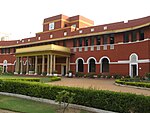Agrasen Ki Baoli

Agrasen Ki Baoli (also known as Ugrasen Ki Baoli; transl. Baoli of Agrasen) is a 60-meter long and 15-meter wide historical step well in New Delhi, India.Located on Hailey Road, near Connaught Place, Jantar Mantar, it was designated a protected monument by the Archaeological Survey of India (ASI) under the Ancient Monuments and Archaeological Sites and Remains Act of 1958. Although there are no known historical records to prove who built the stepwell, it is believed that it was originally built by the legendary king Agrasen, and the present architecture hints at it being rebuilt in the 14th century during the Tughlag or Lodi period of the Delhi Sultanate. The Baoli is open daily from 9 AM to 5:30 PM.
Excerpt from the Wikipedia article Agrasen Ki Baoli (License: CC BY-SA 3.0, Authors, Images).Agrasen Ki Baoli
Hailey Road, New Delhi
Geographical coordinates (GPS) Address External links Nearby Places Show on map
Geographical coordinates (GPS)
| Latitude | Longitude |
|---|---|
| N 28.626111111111 ° | E 77.225 ° |
Address
Agrasen ki Baoli (Ugrasen ki Baoli)
Hailey Road
110001 New Delhi (Chanakya Puri Tehsil)
Delhi, India
Open on Google Maps






